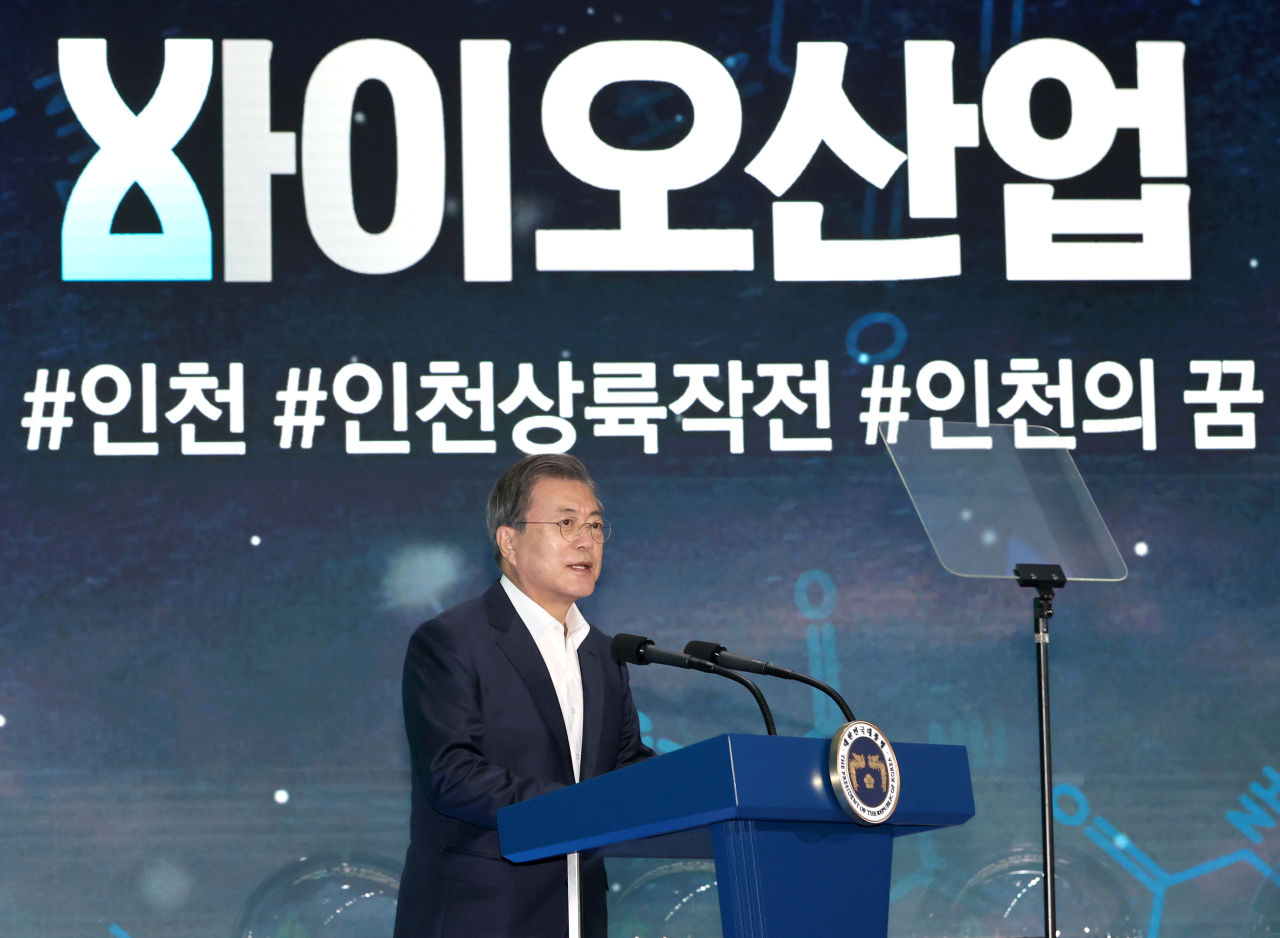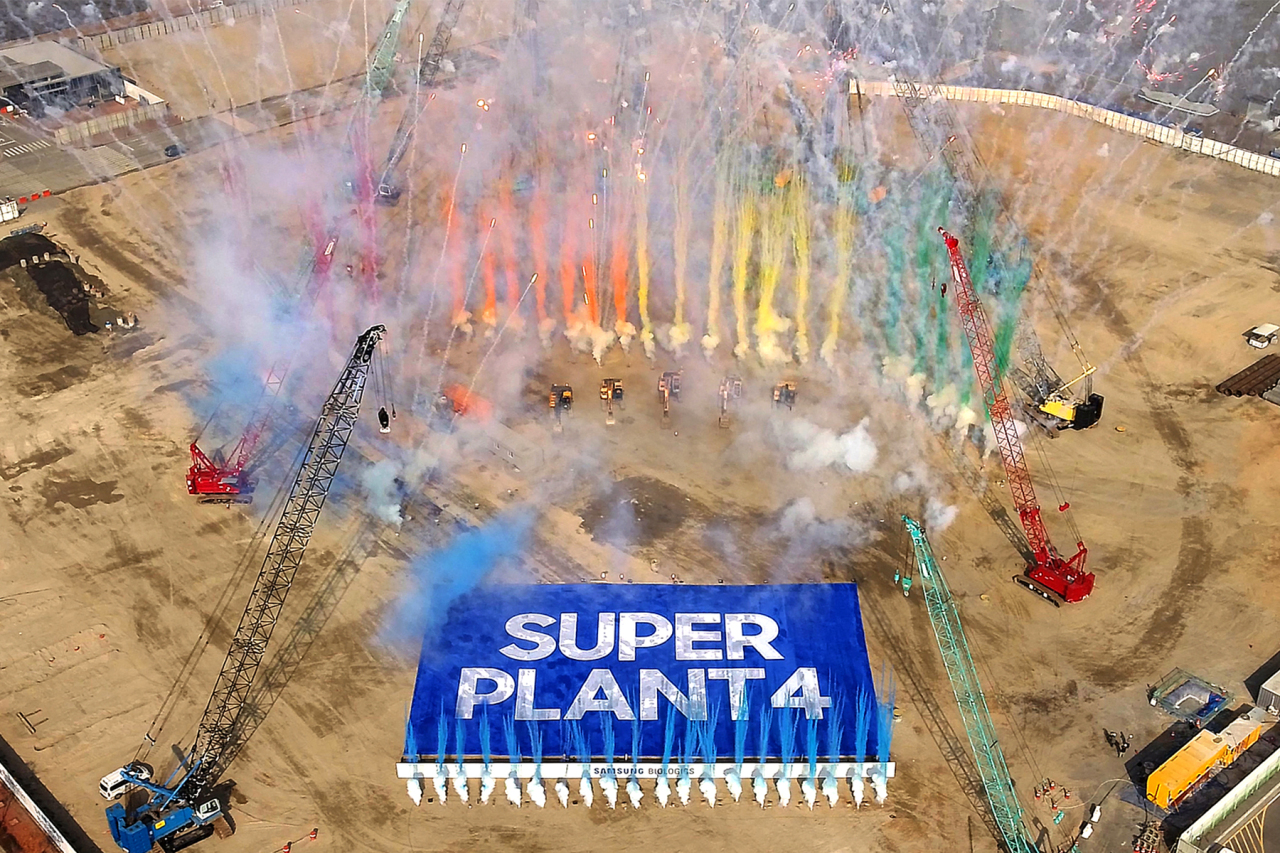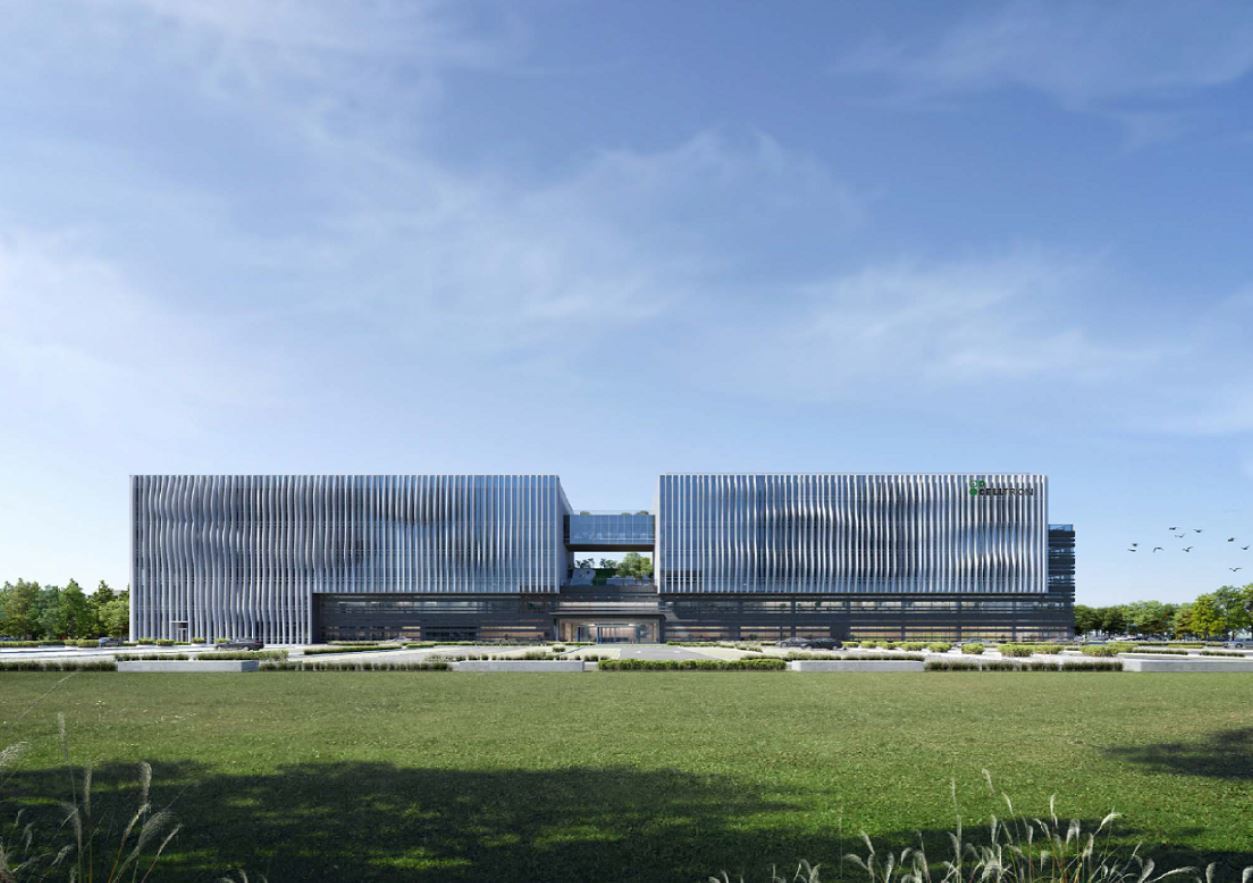Korea plans up to W10tr investment for biohealth by 2023
Government, Samsung Biologics and Celltrion pledge trillions of won to make Songdo world’s best bio hub
By Lim Jeong-yeoPublished : Nov. 18, 2020 - 17:13

South Korea’s newfound focus on the bio industry is only anticipated to further concentrate on the heel of announcements made Wednesday by the nation’s leading biologics companies that they will invest hundreds of billions of won to building additional plants in the bio cluster city of Songdo, Incheon.
Samsung Biologics will pour 1.7 trillion won ($1.54 billion) into its new Plant 4, and Celltrion 500 billion won to its Global Life Science Research Lab and Plant 3. The Government also pledged 1.7 trillion won budget in 2021 for bio health industry, which is a 30 percent increased budget compared to last year’s, reflecting the growing interest from the Korean government to build up the national ecosystem for biologics industry. By 2023, the total amount of private investments for biohealth industry will amount to 10 trillion won, the Korean government projected.
President Moon Jae-in personally attended the memorandum of understanding ceremony Wednesday at Yonsei University Global Campus in Songdo to encourage and promise governmental support in the private companies’ endeavors.
Also among the attendees were Finance Minister Hong Nam-ki, who doubles as deputy prime minister for economic affairs, Industry Minister Sung Yoon-mo, Science Minister Choi Ki-young, Health Minister Park Neung-hoo and Drugs Minister Kim Gang-lib, as well as Incheon Mayor Park Nam-choon. Heads of parts and equipment companies Junghyun Plant and Wiatek and students in biologics and relevant fields were also included.
Korea’s action plan for a more robust bio industry ecosystem is to inject 1.7 trillion won from the budget in 2021, up 30 percent from that assigned a year prior, and to foster specialized future experts and collaboration with small and medium-sized companies.
In the world market, the biologics industry is notching an annual average growth rate of 4 percent, higher than makers of ships at 2.9 percent and automakers at 1.5 percent, according to the government agencies.
Taking this into consideration, the biohealth players in Korea are seeking to create synergy by building an ecosystem for biologics in Songdo.
There are now over 60 bio-related companies in Songdo, including both Korean and global firms. These firms employ some 7,000 workers.
By 2023, about 10 trillion won of investment is expected to be made in the city by some 40 health care and venture capital firms, resulting in an annual 20 percent growth of manufacturing capacity and the additional employment of approximately 9,300.
The government envisions growing a workforce of some 47,000 in biologics by 2025 in a joint effort with the industry and academia. To that end, at Yonsei University Global Campus a center to foster biologics processing experts will be established.
In the big picture of nationwide efforts to grow the biologics industry, regional bio clusters of Songdo in Incheon, Wonju in Gangwon Province, Osong in North Chungcheong Province and Daegu will increase collaboration.
The governmental budget of 1.7 trillion won will prioritize pharmaceuticals, medical devices and digital health care, in that order.
Samsung Biologics will pour 1.7 trillion won ($1.54 billion) into its new Plant 4, and Celltrion 500 billion won to its Global Life Science Research Lab and Plant 3. The Government also pledged 1.7 trillion won budget in 2021 for bio health industry, which is a 30 percent increased budget compared to last year’s, reflecting the growing interest from the Korean government to build up the national ecosystem for biologics industry. By 2023, the total amount of private investments for biohealth industry will amount to 10 trillion won, the Korean government projected.
President Moon Jae-in personally attended the memorandum of understanding ceremony Wednesday at Yonsei University Global Campus in Songdo to encourage and promise governmental support in the private companies’ endeavors.
Also among the attendees were Finance Minister Hong Nam-ki, who doubles as deputy prime minister for economic affairs, Industry Minister Sung Yoon-mo, Science Minister Choi Ki-young, Health Minister Park Neung-hoo and Drugs Minister Kim Gang-lib, as well as Incheon Mayor Park Nam-choon. Heads of parts and equipment companies Junghyun Plant and Wiatek and students in biologics and relevant fields were also included.
Korea’s action plan for a more robust bio industry ecosystem is to inject 1.7 trillion won from the budget in 2021, up 30 percent from that assigned a year prior, and to foster specialized future experts and collaboration with small and medium-sized companies.
In the world market, the biologics industry is notching an annual average growth rate of 4 percent, higher than makers of ships at 2.9 percent and automakers at 1.5 percent, according to the government agencies.
Taking this into consideration, the biohealth players in Korea are seeking to create synergy by building an ecosystem for biologics in Songdo.
There are now over 60 bio-related companies in Songdo, including both Korean and global firms. These firms employ some 7,000 workers.
By 2023, about 10 trillion won of investment is expected to be made in the city by some 40 health care and venture capital firms, resulting in an annual 20 percent growth of manufacturing capacity and the additional employment of approximately 9,300.
The government envisions growing a workforce of some 47,000 in biologics by 2025 in a joint effort with the industry and academia. To that end, at Yonsei University Global Campus a center to foster biologics processing experts will be established.
In the big picture of nationwide efforts to grow the biologics industry, regional bio clusters of Songdo in Incheon, Wonju in Gangwon Province, Osong in North Chungcheong Province and Daegu will increase collaboration.
The governmental budget of 1.7 trillion won will prioritize pharmaceuticals, medical devices and digital health care, in that order.

On the day, in front of the president and ministry chiefs, Samsung Biologics CEO Kim Tae-han presented a virtual groundbreaking ceremony for the company’s Plant 4, referring to it as the “Super Plant.”
Projected to begin partial manufacturing from 2022 and full operations in 2023, Plant 4 will have capacity of 256,000 liters. This surpasses the record of Samsung Biologics’ Plant 3 as the largest biologics manufacturing plant in the world with 180,000 liters.
The Super Plant alone will sprawl across 238,000 square meters, nearing the combined land size of Samsung Biologics Plants 1, 2 and 3 combined, at 240,000 square meters.
The company will inject 1.74 trillion won to build the massive plant, and employ an additional workforce of 1,850.
Once Plant 4 is complete, Samsung Biologics will purchase another slab of land in Songdo to start a second campus of its facilities, Samsung Biologics CEO Kim Tae-han said at the ceremony.
Projected to begin partial manufacturing from 2022 and full operations in 2023, Plant 4 will have capacity of 256,000 liters. This surpasses the record of Samsung Biologics’ Plant 3 as the largest biologics manufacturing plant in the world with 180,000 liters.
The Super Plant alone will sprawl across 238,000 square meters, nearing the combined land size of Samsung Biologics Plants 1, 2 and 3 combined, at 240,000 square meters.
The company will inject 1.74 trillion won to build the massive plant, and employ an additional workforce of 1,850.
Once Plant 4 is complete, Samsung Biologics will purchase another slab of land in Songdo to start a second campus of its facilities, Samsung Biologics CEO Kim Tae-han said at the ceremony.

Celltrion announced plans to build a Global Life Science Research Center and Plant 3, with a capacity of 600,000 liters, comprising eight 7,500-liter bio tanks.
The antibody maker is not stopping there -- Celltrion Chairman Seo Jung-jin said at Wednesday’s event that the company is mulling Plant 4 in the near future, with aims to expand its total production output to 600,000 liters as fast as the company can manage.
If executed, this plan would triple Celltrion’s current manufacturing capacity of 190,000 liters in a single generation. According to Seo, Celltrion is mulling facilities of 200,000 liters in Songdo, with the rest located overseas.
Global Life Science Research Center will complete construction by July 2022 and accommodate 2,500 additional researchers. Plant 3 will have its groundbreaking in 2021 and finish building by May 2023.
“How we compete against multinational companies with more than a century of history is through advanced technology and our fighter spirit,” Seo said.
Celltrion will carry out in stages investments of 40 trillion won through 2030.
Celltrion began in 2002 as a six-person startup. This year, it is on track to place No. 30-35 among some 300,000 biologics companies in terms of operating profit.
With Samsung Biologics’ and Celltrion’s investments, Korea as a nation will have the capacity to manufacture 910,000 liters of biologics a year. Songdo as a city will have the world’s biggest manufacturing output of biologics substances.
“The reason we must combine forces in the bio industry is clear, because it is something we can be good at,” said President Moon Jae-in at the ceremony.
“The answer to humanity’s wishes to live long healthily lies in the bio industry,” Moon said. “And so long as human longevity continues to lengthen, the bio industry will always be a future growth driver.”
“Just a few years ago, biologics was an area with a great hurdle. When the free trade agreement between the US and Korea was signed, we expected bio to suffer among the worst blows,” Moon said.
“But now the Republic of Korea is rewriting history for the bio industry. For now, we only account for 2 percent of the world bio market. But armed with global No. 2 capability to manufacture biopharmaceuticals, we now have the growing confidence that we can achieve greater goals,” Moon said.
Heading forward, Korea’s Industry, Science and Health ministries would work to combine electronics, chemicals, energy, manufacturing, data, networks, artificial intelligence and semiconductors with biotechnologies.
This is anticipated to bring forth innovative research on human-augmented robots, cerebral computer interfaces, eco-friendly plastics, functional fibers, renewable green energy and breakthroughs in manufacturing models leveraging microorganisms.
Big data with biotech will enable customized personal treatments, while communications will enable real-time patient monitoring. Artificial intelligence will help conduct research more quickly, with semiconductors and software technologies aiding in early diagnoses.
By Lim Jeong-yeo (kaylalim@heraldcorp.com)









![[Kim Seong-kon] Democracy and the future of South Korea](http://res.heraldm.com/phpwas/restmb_idxmake.php?idx=644&simg=/content/image/2024/04/16/20240416050802_0.jpg&u=)







![[KH Explains] Hyundai's full hybrid edge to pay off amid slow transition to pure EVs](http://res.heraldm.com/phpwas/restmb_idxmake.php?idx=652&simg=/content/image/2024/04/18/20240418050645_0.jpg&u=20240418181020)

![[Today’s K-pop] Zico drops snippet of collaboration with Jennie](http://res.heraldm.com/phpwas/restmb_idxmake.php?idx=642&simg=/content/image/2024/04/18/20240418050702_0.jpg&u=)